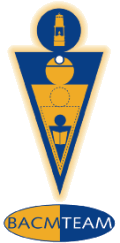British Association of Colliery Management – Technical, Energy and Administrative Management
British Association of Colliery Management - Technical, Energy and Administrative Management | |
 | |
| Merged into | Prospect |
|---|---|
| Founded | 1940s |
| Dissolved | 31 October 2014 |
| Headquarters | Edwinstowe, England |
| Location | |
| Members | 2,664 |
Key people | Phil Huddleston, President Pat Carragher, General Secretary |
| Affiliations | TUC |
| Website | bacmteam.org.uk |
The British Association of Colliery Management – Technical, Energy and Administrative Management (BACM-TEAM) was a trade union in the United Kingdom. It merged with Prospect in 2014.[1]
The union was founded in the early 1940s as the Yorkshire Association of Colliery Officials and Staff,[2] representing managers in the coal industry, from oversmen up.[3] It rapidly gained members across the country, and renamed itself as the British Association of Colliery Officials and Staff. In 1947, following the nationalisation of the coal industry, it became the British Association of Colliery Management.[4]
The union tried to recruit workers at the new National Coal Board, but struggled as most were from a more radical tradition, and they instead formed the National Coal Board Labour Staff Association (LSA). Over time, the BACM became the leading union in negotiations relating to the board, and the LSA finally merged with it in 1971.[5]
The union affiliated to the Trades Union Congress in 1977, by which time it had 15,769 members. However, due to the closure of much of the British mining industry, its membership was down to 5,640 in 1993, and it decided to recruit members in other industrial sectors. In 1997, the "Technical, Energy, and Administrative Membership" section was created to represent those members and, the following year, it was appended to the official name of the union. By 2004, 60 per cent of its membership worked outside the coal industry.[2]
References
[edit]- ^ "The British Association of Colliery Management". Archived from the original on 24 December 2012. Retrieved 16 June 2015.
- ^ a b John B. Smethurst and Peter Carter, Historical Directory of Trade Unions, p.528
- ^ British Institute of Management, Three Studies in Management, p.54
- ^ A brief history Archived April 7, 2011, at the Wayback Machine, BACM-TEAM
- ^ Arthur Marsh and Victoria Ryan, Historical Directory of Trade Unions, vol.1, p.145
External links
[edit]- Coal mining in the United Kingdom
- Doncaster
- Energy industry trade unions
- Mining trade unions
- Newark and Sherwood
- Trade unions based in Nottinghamshire
- Organizations established in the 1940s
- Defunct trade unions of the United Kingdom
- 1940s establishments in the United Kingdom
- Trade unions established in the 1940s
- Trade unions disestablished in 2014
